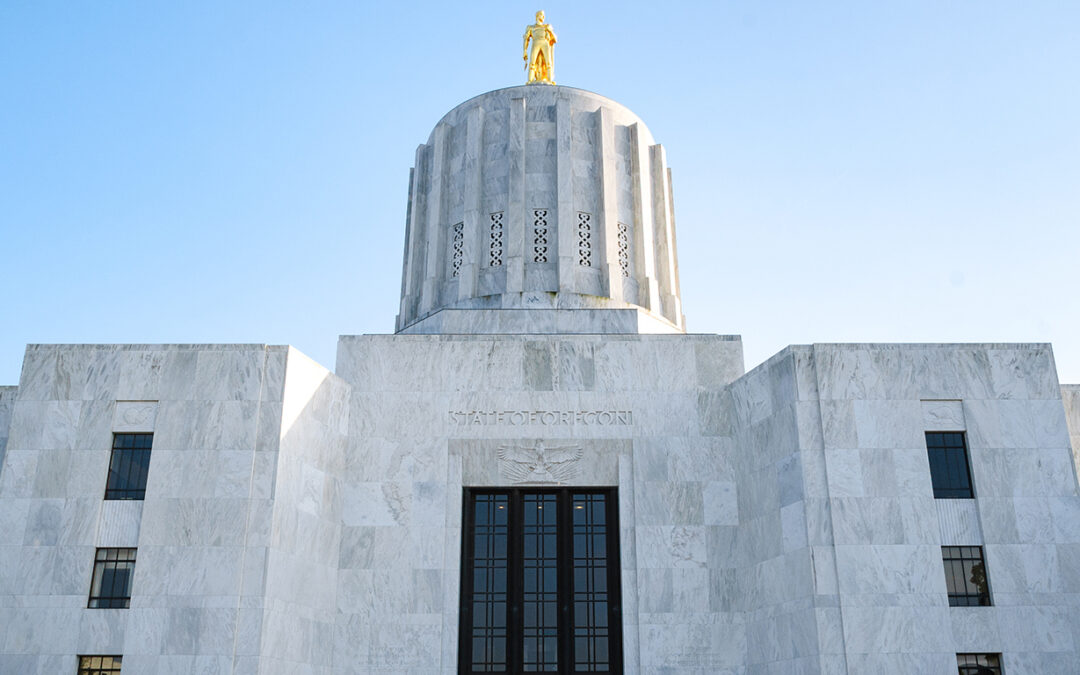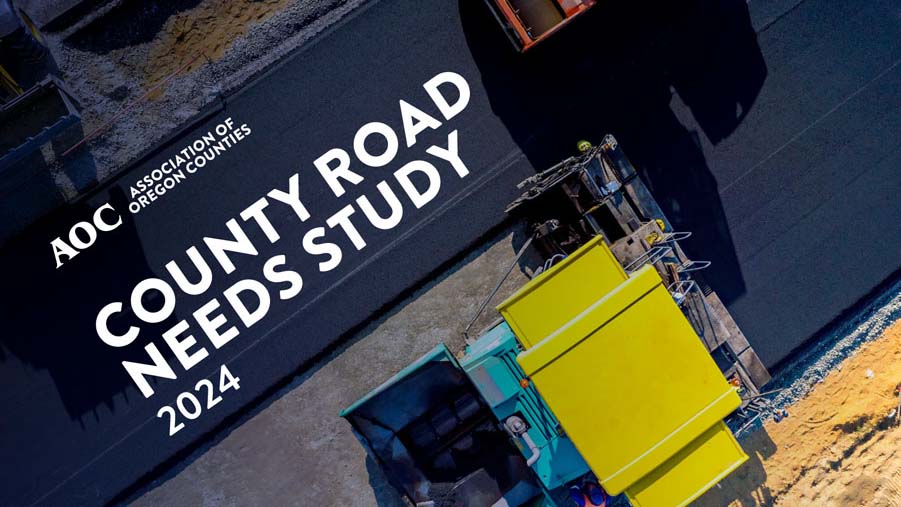
Sep 30, 2024 | AOC News, Events
AOC’s Annual Conference, held in Lane County, Nov. 19-21, draws together a cross section of elected officials, county staff, partners, and other participants for educational opportunities, leadership development, and networking.
AOC President and Marion County Commissioner Danielle Bethell was instrumental in shaping the programming for this year’s conference. Her focus as president — fostering engagement and collaboration — will be evident through numerous opportunities, including an expanded attendee lounge to enhance connections.
“This year’s conference will embody our motto — United Counties, United Oregon,” said Bethell, “and serve as a powerful reflection of the critical work counties do for Oregon and the collective impact that comes from collaboration.”
The opening general session keynote speaker will present on conquering fear. In addition, a dynamic lineup of educational workshops will provide an in-depth exploration of critical issues impacting the future of our communities:
- 2025 transportation package
- Oregon’s land use system
- County deflection programs
- Wildfires
- County assessment and taxation
- Communicable diseases
- Homelessness
- Community corrections
Attendees from rural and urban counties, large and small, participate in the three-day event aimed at improving residents’ lives and the efficiency of county government.
“AOC’s Annual Conference is an opportunity to celebrate the progress we’ve made and strengthen the partnerships that allow us to deliver even better outcomes for the people of Oregon,” said Executive Director Gina Nikkel. “I look forward to connecting with our members, partners, and county staff from across the state.”
Online registration closes Friday, Nov. 1. Find more information and view the agenda on AOC’s conference webpage.
Contributed by: Erin Good | Communications Coordinator

Sep 30, 2024 | Health & Human Services, Public Safety & Veterans
The Deflection Engagement and Coordination ECHO Program is offering free webinars on deflection. View more information on the OHSU October Bulletin and Deflection Brochure.
Deflection Level Setting
Oct. 8, 2024 from 12-2 p.m.
Learn from national expert, Jac Charlier on deflection. This webinar is ideal for anyone working in deflection, law enforcement or social services. Jac Charlier is the Executive Director of TASC’s Center for Health and Justice (CHJ) and Executive Director and co-founder of the Police, Treatment, and Community Collaborative (PTACC). He is a co-founder of the international deflection movement and works to grow and develop the global field of deflection from research to legislation to policy to practice.
Register Here
Deflection Engagement and Coordination ECHO
Oct. 16, 2024 from 12-1 p.m.
This 14 session ECHO meets every 1st and 3rd Wednesday. Connect with others working in deflection, learn from experts and brainstorm difficult cases with your peers in other counties. The purpose of the Deflection Engagement and Coordination ECHO is to develop the deflection skillset and function as a networking space for the multidisciplinary deflection workforce in Oregon. Participants will learn from the ECHO Team and from their peers operating deflection programs across 28 Oregon counties. County teams in planning and in operational phase of new deflection programs are encouraged to register.
Register Here
Motivational Interviewing
Nov. 1, 2024 from 10-11 a.m.
In this informational and practical training, we will explore how to use motivational interviewing to facilitate positive change. In this series of informational and practical trainings, we will explore how to use motivational interviewing to facilitate positive change. The initial training is applicable to all roles; aspects of the method can be applied in even the briefest of client interactions.
Register Here
Contributed by: Jessica Pratt | Legislative Affairs Manager, Health and Human Services

Sep 30, 2024 | AOC Advocacy
The Oregon State Legislature met Sept. 23-25, in Salem, for interim Legislative Days committee hearings. Below are links and highlights from the hearings with particular relevance to county governance, services, and budgets. As always, your AOC Legislative Affairs department actively participated in and monitored hearings, and used the opportunity to connect with legislators, particularly around AOC’s 2025 Session Priorities while they were in Salem.
The legislature will convene for one additional set of Legislative Days before the 2025 regular session — Dec.10-12. View the 2024 Legislative Assembly Interim Calendar here.
Joint Committee on Transportation
House Interim Committee On Revenue
Chair Nathanson directed committee staff to present an update on the twenty-eight (28) bills the committee would be introducing this 2025 legislative session. Notably, three (3) legislative concepts were introduced that are of significant impact to Oregon counties:
- One (1) bill addressing CAFFA funding changes, and;
- Two (2) bills for property tax foreclosures- one that will be systems focused and one that will address additional hopes expressed by the HB 4056 (2024) workgroup.
AOC’s Legislative Affairs department is confident in their next steps having a confirmed vehicle for the governance and revenue steering committee legislative priority- stable and sustainable funding for assessment and taxation.
Senate Interim Committee on Energy and Environment
- Recycling Modernization Act Update
- Work continues to develop curbside recycling programs and a uniform list of recyclable materials statewide. The program coordinator anticipates between $226-292 million will be available for communities to implement the program in the first year, but will have updated figures at the December committee meeting.
- Program is still on target to launch July 1, 2025 with funding beginning that date and fees to producers beginning. Initial fees are being set by type of material now.
Joint Interim Committee on Addiction and Community Safety Response
- Deflection Grant Rollout Overview – CJC Presentation
- HB 4002 Technical Fix Requests
- CJC gave a presentation on the beginning weeks of the deflection program response and noted that it was perhaps too early to draw any conclusions, though the early numbers of arrests for PCS-U were coming near the levels seen pre-COVID and ballot measure 110. Of the $18.4 million in county grant funding, 50% has been allocated to treatment, housing, or other support, while only 14% is earmarked for delivering deflection on the ground through law enforcement or district attorney offices.
- There was some discussion in the committee about the greater need for treatment services availability and the desire to clarify what a deflection program should look like versus one that is diversion.
Senate Committee on Natural Resources and Wildfire
A few presentations were provided to the members of this committee focusing on legislation to come in 2025.
- Oregon Department of Forestry, Office of the State Fire Marshal and Governor’s Office gave a presentation on the Wildfire Funding Work Group meetings which have been meeting monthly since June. The presentation focused on four key concepts for funding: Existing Funding Structures, General Fund Appropriation, New Sources of Revenue, and Changes to existing programs.
- Oregon Forest Industries Council and the Wild Salmon Center presented on the work that has been done on the Private Forest Accords and the need for continued funding in future sessions.
House Committee on Agriculture, Land Use, Natural Resources and Water
Committee members heard many presentations on issues the committee will look into during the ‘25 session.
- In addition to a similar presentation on the Private Forest Accords by OFIC and Wild Salmon Center, the committee had a robust discussion on PFAS (Polyfluoroalkyl Substances). The committee has taken an interest in this issue and will most likely consider legislation to tackle the problem.
- The committee had a discussion on the impacts climate change is having on Agricultural Producers from OSU. This presentation will serve as a ‘tee up’ for the next session’s drought package and potential work around Oregon’s Heat Dome and weather issues.
House Committee on Climate, Energy, and Environment
With a focus on the need to achieve the renewable energy generation by 2040 the Legislature enacted in 2021, the committee heard many presentations around Energy Siting and Energy Demands. The Committee is set to consider legislation in the next session focused on Grid-Enhancing Technologies (GETs) as well as ways to make Transmission Lines easier to permit and site in Oregon.
House and Senate Committees on Judiciary Joint Meeting
The House and Senate committees met together to hear updates on several items, including civil commitment reform updates from Oregon Judicial Department and from NAMI Oregon who has a bill in process for 2025 to lower the bar for civil commitment eligibility.
House Committee on Housing and Homelessness
The committee heard updates on the sustainable shelter funding workgroup led by Rep Marsh and the Governor’s office (on which representatives from Lane, Umatilla and Washington counties sit) and on the impending loss of affordable housing units.
House Committee on Behavioral Health and Health Care
Over two days of hearings, the committee first heard updates from state licensing boards on their progress to improve customer service and expedite applications as well as their thoughts on entering into interstate compacts to speed recruitment of out of state health professionals. On day two, the committee received an update from OHA on implementation of the recently approved Medicaid in carceral setting benefit and updates from the Alcohol & Drug Policy Commission and System of Care Advisory Council.
Contributed by: Mallorie Roberts | Legislative Affairs Director

Sep 30, 2024 | AOC News
The Association of Oregon Counties (AOC) has hired Tim Dooley as its new legislative affairs manager, covering issues related to public safety and veterans.
Dooley brings a wealth of experience in public records management, public safety, and law enforcement administration. Before joining AOC, he oversaw records departments in both a city police department and a sheriff’s office in Oregon, serving as a subject matter expert on public records law and crime data. Dooley led initiatives to modernize public records processes and played a key role in legislative efforts for local government.
“Tim’s dedication to public service paired with his leadership in local government make him an excellent addition to AOC, and we look forward to the positive impact he will make,” said Gina Nikkel, AOC executive director.
Dooley’s first day was Sept. 16.
Contributed by: Erin Good | Communications Coordinator

Sep 25, 2024 | AOC Advocacy, AOC News, Transportation
2024 County Road Needs Study Forecasts $834 Million Annual Revenue Shortfall Statewide for County Roads
Salem, Ore. — Today, the Association of Oregon Counties (AOC) presented its 2024 County Road Needs Study to the Legislative Joint Committee on Transportation, forecasting a statewide annual revenue shortfall of 59 percent over the next five years, resulting in an additional $834 million per year needed to maintain and manage the county road system in a safe and adequate condition.
“The objective of our 2024 study was to determine and demonstrate the funding required to support the county road system to meet the needs of the traveling public over the next five years,” stated AOC County Road Program Director Brian Worley, who presented the report to the lawmakers. “The report concludes that anticipated revenue will not meet even the basic road maintenance and safety needs for most counties. Over the next five years, counties anticipate a 60 percent shortfall for pavement preservation projects and a 70 percent shortfall for capital construction.”
Oregon counties are facing structural funding challenges that impact core services, including maintenance of roads and bridges.
Counties are responsible for the largest share of Oregon’s road system, with 26,744 miles under county jurisdiction, including 3,448 bridges over 20 feet in length.
“Most of the county system was constructed over a half of a century ago, and for the last four decades, county road departments have been prioritizing the maintenance, preservation, and safety of those roads,” said Worley. “However, all counties are seeing dramatic decreases in funding, and the consequences of inadequate funding are unsafe and unreliable bridges and roads.”
As noted in the study, the majority of revenue for county roads come from the State Highway Fund, which comprises 47 percent of incoming revenues on average. For some counties, especially rural areas, operations and maintenance budgets are comprised solely from state support.
“We urge legislators to consider this study in developing a transportation funding package in the 2025 session, and to uphold the 50-30-20 funding formula that supports the full transportation system through shared State Highway Fund revenues,” said Mallorie Roberts, AOC legislative affairs director, “AOC and counties will continue to partner with the state in 2025 to ensure growth and stabilization of the State Highway Fund with diverse and modernized funding mechanisms.”
The current study is an update of AOC’s 2014 study that reported the anticipated needs of road departments from 2014 to 2018. The 2024 study looks at the same road construction and maintenance activities anticipated by individual county road departments.
To read the full 2024 study, and learn more about county road, bridge, and transportation priorities and funding visit oregoncounties.org.
###
About AOC
The Association of Oregon Counties (AOC) unites Oregon’s county governments. Founded in 1906, AOC brings county officials together to advocate with a collective voice on statewide and national policy, exchange ideas, build new leadership skills, and exercise exemplary leadership in public service, while enriching the public’s understanding of county government.





